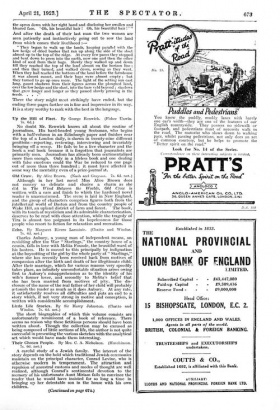STORIES , DREAMS AND ALLEGORIES.t Tms volume, the Preface informs us,
contains all of Olive Schreiner's uncollected imaginative writings, except at least one novel, which it is proposed to publish. The greater part of the book consists of stories and sketches of very unequal merit. " The Wax Doll and the Stepmother " and " The Adventures of Master Towser," written when Olive Schreiner was still a girl, are very charming stories for children. Of the story called " On the Banks of a Full River " it is hardly fair to judge, because, though it has an ending, it-is incom- plete by reason of four gaps in the text. " The Buddhist Priest's Wife " leaves us curiously unsatisfied : it is one of those stories which lays a wide foundation and then builds a superstructure which covers only a portion of it. But the book gains distinction from one supremely good story—the first—called " Eighteen-Ninety-Nine." The style is not always equal to the theme, but the story as a whole is an extremely moving and impressive work. In its large and melancholy presentation of the lives of two women it recalls the Russians. It is the story of life in the remote country in South Africa, a primitive life bound up with the soil which supports it. The land, the old woman and her daughter- in-law are the three things which endure and suffer throughout the story, and all three are presented with a largeness and simplicity which give to them something of the quality of eternal things ; they are the symbols of endless striving and endless suffering. Across this dark background are woven the lives and deaths of their men and boys and the incidents of peace and war. The men and boys die or are killed in the wars. The old woman outlives her husband, her sons, and her young, fair-haired grandson who was killed fighting for the Boers. A letter brings the dreaded news of his death :— " The old woman walked up to her daughter-in-law and grasped her firmly by the arm.
' He's dead 1 You know, my boy's dead I' she cried, drawing
• At the Earth's Core. By Edgar Rice Burroughs. London : Methuen. [7s. 6d. net.) Gs . Stories, Dreams and Allegories. By Olive &Arthur. London : Fisher trimly. net.]
the apron down with her right hand and disclosing her swollen and bleared face. ' Oh, his beautiful hair ! Oh, his beautiful hair ! ' "
And after the death of their last man the two women are seen patiently and instinctively going out to sow the land from which comes their livelihood :- " They began to walk up the lands, keeping parallel with the low hedge of dried bushes that ran up along_the side of the sloot almost up to the top of the ridge. At every few paces they stopped and bent down to press into the earth, now one and then the other kind of seed from their bags. Slowly they walked up and down till they reached the top of the land almost on the horizon line ; and then they turned, and walked down, sowing as they went. When they had reached the bottom of the land before the farmhouse it was almost sunset, and their bags were almost empty ; but they turned to go up once more. The light of the setting sun cast long, gaunt shadows from their figures across the ploughed land, over the low hedge and the sloot, into the bare veld beyond ; shadows that grew longer and longer as they passed slowly pressing in the Deeds. . . . '
There the story might most strikingly have ended, but the ending three pages further on is fine and impressive in its way. It is a story worthy to rank with the best in the language.











































 Previous page
Previous page